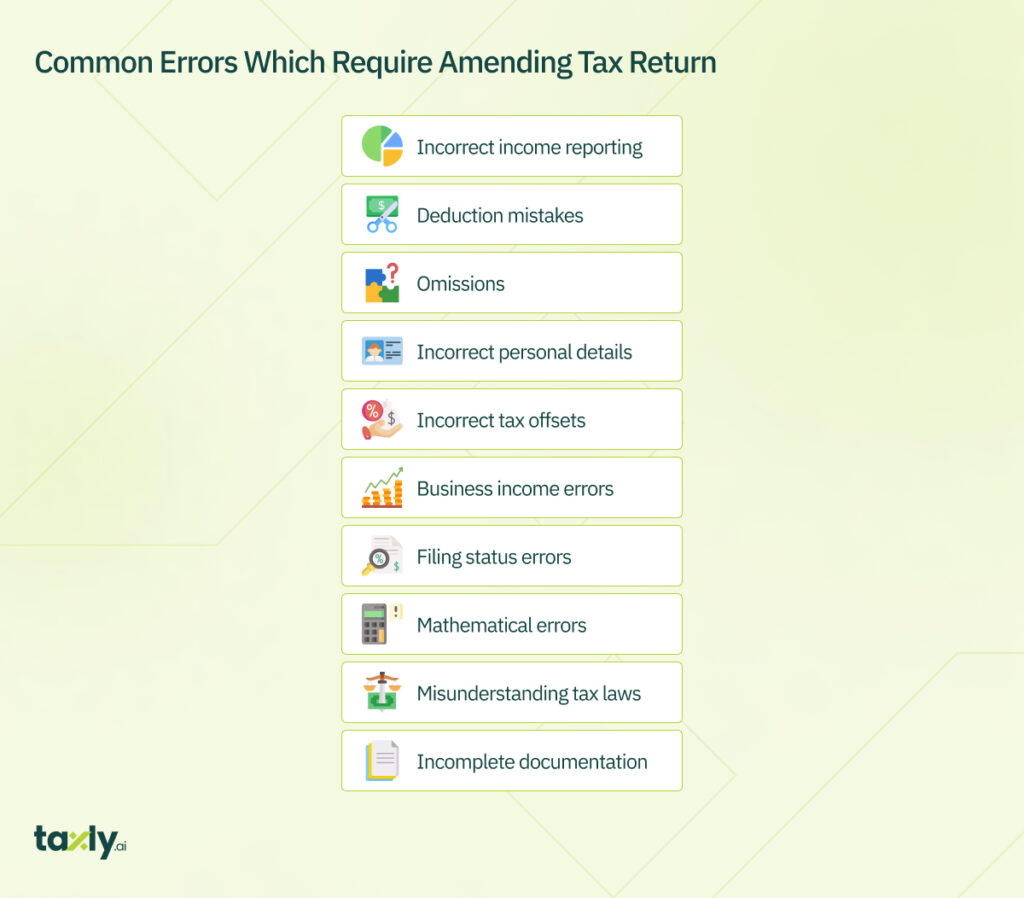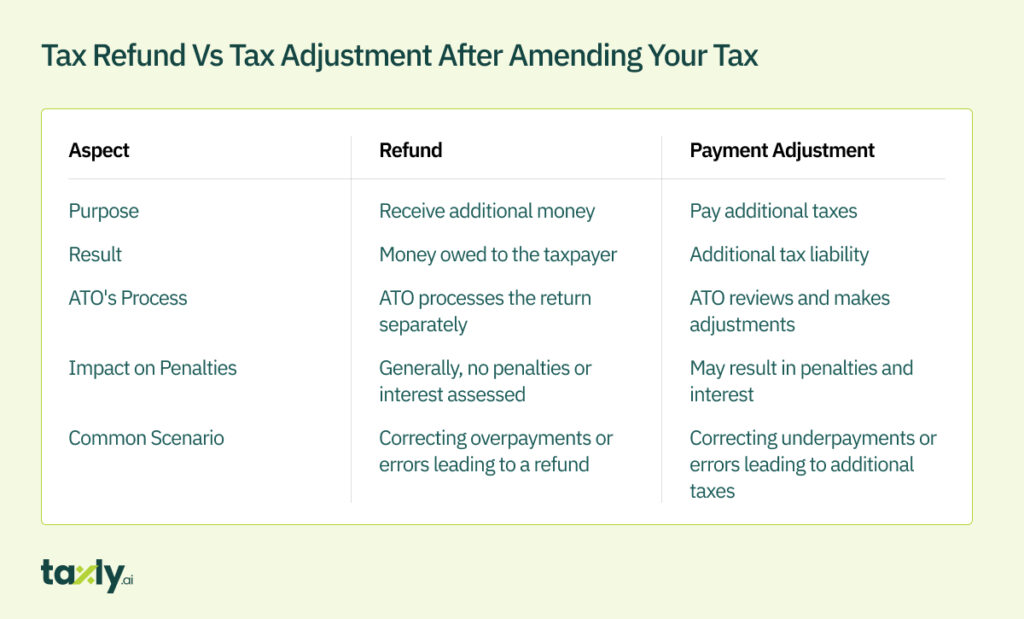An amended tax return, also known as a ‘Notice of Amendment,’ allows you to correct any mistakes or update information on your previously lodged tax return. This can include changes to your income, deductions, credits, or any other relevant tax-related details. You may need to amend your tax return in case of Errors, Omissions, Changes in Financial Situation.
Amended tax return allows you to:
- Correct Mistakes made on your original return and maintain tax information accuracy.
- Claim Missed Deductions or Credits that you may have overlooked on your initial filing
- Update Filing Status if your marital status or other circumstances have changed since your original filing.
5 Steps to File an Amended Tax Return:
Step 1: Gather Documentation:
Collect all the relevant documents, such as your original tax return, income statements, deductions, and any additional information that supports your changes.
You will need:
- Proof of Identity Documents:
You will generally need original documents to establish your identity. Commonly accepted documents include:
- Passport
- Australian driver’s license
- Birth certificate
- ImmiCard
- Additional Documents:
In some cases, you may be required to provide additional documents, such as:
- Visa grant notice
- Citizenship certificate
- Certificate of identity
- Additional Information:
You might need to provide additional information, such as your tax residency status, address details, and other personal information.
Step 2: Complete the NAT-1432 Form:
In Australia, you should use the “Request for Amendment of Income Tax Return” form (NAT 1432). You can access this form through the Australian Taxation Office (ATO) website or by contacting them directly. Make sure to provide detailed explanations for the changes you’re making.
Part A: Taxpayer Details:
- Tax File Number (TFN): Input your unique TFN issued by the Australian Taxation Office (ATO).
- Full Name: Enter your full legal name.
- Address: Provide your current residential address.
- Date of Birth: Input your date of birth.
Part B: Amendment Request:
- Year Ended: Enter the income year for which you are amending your tax return (e.g., 2022-23 for the financial year that ends on June 30, 2023).
- Reason for Amendment: Clearly explain the reason for the amendment. For example, if you made an error on your original return, provide a detailed description of the mistake.
- Declaration: Sign and date this section to declare that the information provided is accurate and complete.
Part C: Details of Amendment:
- Income Items: Specify the income items that you are amending. You should provide details of the changes you are making, such as the amount and the nature of the income.
- Deduction Items: If you are amending deductions, provide a detailed breakdown of the changes, including the type of deduction, amount, and justification.
- Tax Offsets: If you are claiming tax offsets or changing existing ones, detail the offset and the reason for the change.
- Tax Payment or Refund: Indicate whether you expect to pay additional tax or receive a refund. Provide the details of any payment or refund requested.
Part D: Agent or Legal Personal Representative (if applicable):
Agent or Representative Details: If you are using an agent or legal personal representative to complete the form, provide their details.
Part E: Declaration:
Declaration by Agent or Legal Personal Representative (if applicable): If you are using an agent or representative, they should sign and date this section.
Additional Information:
Attachments: If you have any supporting documents or additional information to substantiate your amendment, attach them to the form.
Step 3: Submit the Form:
Fill out the NAT 1432 form completely and accurately. Be specific about what you are changing and why. Attach any supporting documents as needed. You can submit the form either online through the ATO’s online services or by mailing it to the address provided on the form.
You can request an amendment through:
- Online Amendment: You can use the ATO online services through myGov for an online amendment.
- Paper Form: You can use the paper form “Request for amendment of income tax return for individuals. Click here to pre-order the paper NAT-1432 form.
- Letter: You can also submit an amendment request via letter.
Step 4: Wait for Confirmation:
The ATO will review your amended return, which may take some time. You will receive a Notice of Amended Assessment when the process is complete. This document will outline any additional tax owed or refunds due.
Step 5: Pay or Receive a Refund:
If you owe additional taxes, make sure to pay them promptly to avoid penalties or interest charges. If you’re eligible for a refund, the ATO will issue it to you.

Amended Tax Return Deadlines:
Generally, you have two years from the date you originally lodged your tax return to amend it. Beyond this period, you’ll need to request special permission from the ATO to make changes.
Important Tips for Amended Tax Return:
- Ensure accuracy: Double-check all your information before submitting your amended return to avoid additional issues.
- Keep records: Retain copies of all documents related to your tax return for at least five years.
- Seek professional help: If you’re unsure about the process or your tax situation is complex, consider consulting a tax professional or accountant for guidance.
- Provide Clear Explanations: Clearly state the reasons for your amendments on the form to aid the ATO’s understanding.
- Be Patient with Processing: Understand that the ATO may take time to process your amended return, and wait for their Notice of Amended Assessment.
- Timely Tax Settlement: If you owe additional taxes due to the amendment, ensure you pay on time to avoid penalties or interest charges.
Amended Tax Return Frequently Asked Questions
How long do the ATO have to amend a tax return?
The ATO (Australian Taxation Office) has specific time limits for amending a tax return, and these limits vary depending on whether you are an individual or a tax professional. Here are the time limits for tax return amendments:
For Individuals and Sole Traders:
Individuals and sole traders generally have 2 years to submit an amendment to their tax return. This time period starts from the day after the notice of assessment is issued.
Suggested Read: Sole Trader Tax Deductions in Australia: A Comprehensive Guide
For Tax Professionals:
Tax professionals should note that a 4-year time limit applies to claiming a refund or credit for indirect taxes. The amended return must also pass the PLS (Practitioner Lodgment Service) validation rules to be processed.
Can the ATO amend your tax return?
Yes, the ATO (Australian Taxation Office) can amend your tax return under certain circumstances. Here’s how it works:
Self-Amendment:
If you identify an error or omission in your tax return after you’ve filed it, you can amend your tax return. Individuals and sole traders generally have 2 years from the day after receiving their notice of assessment to submit an amendment.
ATO Amendment:
The ATO can also amend your tax return. They may do so if they identify errors or inconsistencies in your return during their review process. The standard period for the ATO to amend an assessment is four years for most businesses in privately owned and wealthy groups.
Refund or Credit Claim:
There is a 4-year time limit for claiming a refund or credit for indirect taxes. This applies to tax professionals and pertains to entitlements to credits or refunds.
Tax Refund Vs Tax Adjustment After Amending Your Tax

The Bottomline
Amended tax return assures that your tax assessment is correct and reflects your true financial situation. It may result in either a refund (if you’ve overpaid taxes) or an additional tax payment (if you’ve underreported income or deductions).
Explore More Topics


Comments are closed